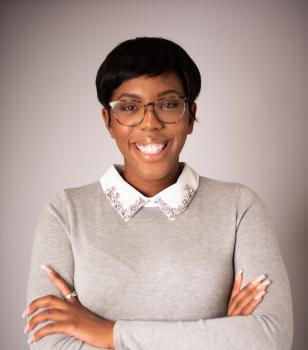Maya Johnson Joins Arcadia as Assistant Director of Counseling / Diversity Initiatives

In January 2022, Maya Johnson, M.S., LPC, joined Arcadia University as assistant director of Counseling/Diversity and Inclusion Initiatives. Her role includes working with Counseling Services and with campus partners—staff, faculty, and students—to identify and develop strategies to best support students from diverse backgrounds and with diverse identities, with an emphasis on supporting Black students. She also provides counseling services as part of the clinical staff.
Johnson is a licensed professional counselor who holds a master’s degree in clinical and counseling psychology from Chestnut Hill College. She has extensive experience working with trauma and addiction in youth and families involved in the juvenile justice system, most recently at the Public Health Management Corp. She also has experience in student affairs as a former residence coordinator at Chestnut Hill College and as an resident assistant at Temple University.
“Being back on a college campus has been such an exciting part of my new position,” she says. “I have a background in residence life, and I did not realize how much I have missed being surrounded by college students. The energy on campus is invigorating.”
Johnson also is gratified to be serving as a Black therapist — a role she feels is much-needed, and one that aligns with Arcadia’s initiatives to support an improved campus climate for students of color that encourages persistence to graduation. “I’ve always loved psychology and was blessed to have had my own positive experience with a Black therapist in the past,” she says. “This led me to want to be a representative within the field. I have a personal goal to destigmatize therapy in the Black community and normalize seeking help and prioritizing mental health.”
Amy Henning, director of Arcadia’s Counseling Services, adds, “The connections that Maya has already made with our students from various racial identities will assist in helping more students feel comfortable using our services and reduce the stigma around asking for help. Maya will also play an integral role in seeking out and listening to our students’ mental health and overall wellness needs so we can better serve our students, but especially our students of color.”
Johnson wants students who might be struggling with emotional and mental health issues to know that “you are not alone. I would like more students to know that they can seek help and they won’t be judged for doing so. Asking for help is extremely courageous and I want more students to realize that they don’t have to carry the burden of their stress on their own.”
Building relationships with students has occupied much of Johnson’s focus to date, along with assessing the needs of the campus. “I feel strongly about doing outreach with student groups and helping to bring awareness of the importance of mental health to all students,” she says.
Johnson notes that Counseling Services recently has worked to develop its diversity statement, which the team plans on sharing with the University community soon. “In creating the statement, we made sure to be introspective and honest about the ways that systemic injustices impact our students and their mental wellness and our commitment to doing our part in dismantling those things.”
Most of all, Johnson strives to familiarize herself with the Arcadia student body to learn more about issues that affect their educational and campus experiences.
“Counseling Services is seeing anxiety and depression as the most common diagnosis, but there is often a lot of comorbidity that exists,” she says. ”Some clients have traumatic histories that make them more vulnerable to other serious disorders. I am happy to see that many students feel comfortable reaching out to Counseling Services, but I’d like to see more marginalized populations seeking therapy.
“Mental and emotional wellness can look different from one individual to the next,” Johnson continues. “I recommend people take time to reflect and figure out what they truly need to live a balanced and healthy life, and then do those things. That could be exercising, going to therapy, creating healthy boundaries in relationships, or prioritizing self-care.”


